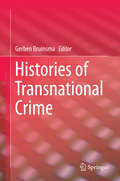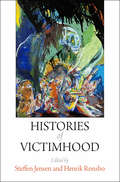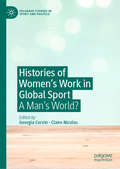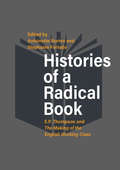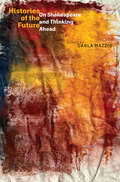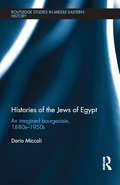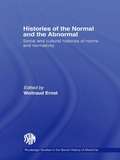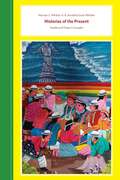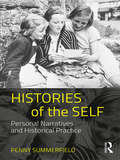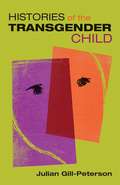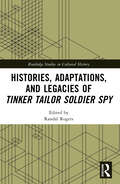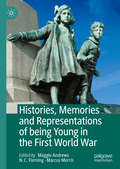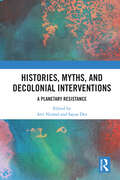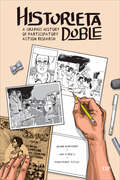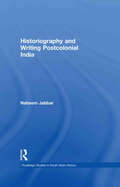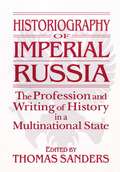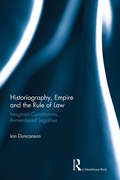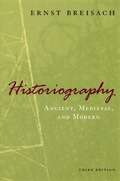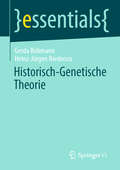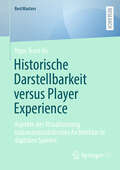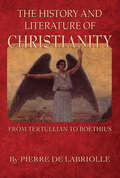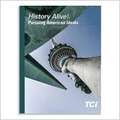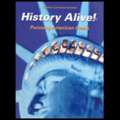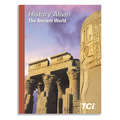- Table View
- List View
Histories of Transnational Crime
by Gerben BruinsmaHistories of Transnational Crime provides a broad, historical framework for understanding the developments in research of transnational crime over the centuries. This volume provides examples of transnational crime, and places them in a broad historical context, which has so far been missing from this field of study. The contributions to this comprehensive volume explore the causes and historical precursors of six main types of transnational crime: -piracy -human smuggling -arms trafficking -drug trafficking -art and antique trafficking -corporate crime. The historical contributions demonstrate that transnational crime is not a novel phenomenon of recent globalization and that, beyond organized crime groups, powerful individuals, governments and business corporations have been heavily involved. Through a systematic historical and contextual analysis of these types of transnational crime, the contributions to this volume provide a fundamental understanding of why and how various forms of transnational crime are still present in the contemporary world. In the past two decades, the study of transnational crime has developed from a subset of the study of organized crime to its own recognized field of study, covering distinct societal threats and requiring a particular approach.
Histories of Victimhood (The Ethnography of Political Violence)
by Steffen Jensen Henrik RonsboThe word and concept of victim bear a heavy weight. To represent oneself or to be represented as a victim is often a first and vital step toward having one's suffering and one's claims to rights socially and legally recognized. Yet to name oneself or be called a victim is a risky claim, and social scientists must struggle to avoid erasing either survivors' experience of suffering or their agency and resourcefulness. Histories of Victimhood engages with this dilemma, asking how one may recognize and acknowledge suffering without essentializing affected communities and individuals.This volume tackles the theoretical and empirical questions surrounding the ways victims and victimhood are constructed, represented, and managed by state and nonstate actors. Geographically broad, the twelve essays in this volume trace histories of victimhood in Colombia, India, South Africa, Guatemala, Angola, Sierra Leone, Turkey, Occupied Palestine, Denmark, and Britain. They examine the implications of victimhood in a wide range of contexts, including violent occupations, displacement, war, reparation projects, refugee assistance, HIV treatment, trauma intervention, social welfare projects, and state formation. In exploring varying forms of hardship and identifying what people do to survive, how they make sense of their own suffering, and how they are frequently either acted upon or ignored by humanitarian agencies and states, Histories of Victimhood encourages us to see victimhood not as a definite and definable category of experience but as a changeable and culturally contingent state.Contributors: Sofie Danneskiold-Samsøe, Pamila Gupta, Ravinder Kaur, Stine Finne Jakobsen, Andrew M. Jefferson, Steffen Jensen, Tobias Kelly, Frédéric Le Marcis, Walter Paniagua, Elizabeth A. Povinelli, Darius Rejali, Henrik Ronsbo, Lotte Buch Segal, Nerina Weiss.
Histories of Women's Work in Global Sport: A Man’s World? (Palgrave Studies in Sport and Politics)
by Georgia Cervin Claire NicolasSport has never been a man’s world. As this volume shows, women have served key roles not only as athletes and spectators, but as administrators, workers, decision-makers, and leaders in sporting organizations around the world. Contributors excavate scarce archival material to uncover histories of women’s work in sport, from swimming teachers in nineteenth-century England to national sports administrators in twentieth-century Côte d’Ivoire, and many places in between. Their work has been varied, holding roles as teachers, wives, and secretaries in sporting contexts around the world, often with diplomatic functions—including at the 1968 and 1992 Olympic Games. Finally, this collection shows how gender initiatives have developed in sporting institutions in Europe and international sport federations today. With a foreword by Grégory Quin and afterword by Anaïs Bohuon, this is a pioneering study into gender and women’s work in global sport.
Histories of a Radical Book: E. P. Thompson and <em>The Making of the English Working Class</em>
by Antoinette Burton and Stephanie FortadoFor better or worse, E.P. Thompson’s monumental book The Making of the English Working Class has played an essential role in shaping the intellectual lives of generations of readers since its original publication in 1963. This collected volume explores the complex impact of Thompson’s book, both as an intellectual project and material object, relating it to the social and cultural history of the book form itself—an enduring artifact of English history.
Histories of the Future: On Shakespeare and Thinking Ahead
by Carla MazzioWhat early modern and Shakespeare studies have to offer contemporary thinking about the futureWhat do early modern and Shakespeare studies have to offer contemporary thinking about the future? Joining a series of urgent conversations about “the future” as an object of analysis and theorization in early modern history, art history, literature, science, theology, and law, Histories of the Future addresses this question directly. This volume brings together essays that draw on early modern modes of “thinking ahead” to reconsider the ways in which the teaching and reading of Shakespeare help shape how one imagines the future from the vantage point of today.By stressing the importance of understanding how future-oriented thinking in the past informs perceptions of possibility in the present—with special attention to contemporary issues of climate change, economic inequality, race and indigeneity, queer lives, physical and mental health crises, academic precarity, conditions of scholarly labor, and the ongoing disastrous effects of settler colonialism—Histories of the Future contributes to a rich and expanding field of scholarship on temporality in pre- and early modern literatures and cultures. In the process, it also engages with key insights of twenty-first-century critical and cultural theory in reexamining historical issues ranging from the imagined inevitability of progress or apocalypse to fraught conditions of succession, chronology, catastrophe, influence, prophecy, and risk.With essays by J. K. Barret, Urvashi Chakravarty, Drew Daniel, John Garrison, Margreta de Grazia, Jean E. Howard, Jeffrey Masten, Marissa Nicosia, Vimala Pasupathi, Kathryn Vomero Santos, and Scott Manning Stevens, Histories of the Future explores the possibilities and limits of early modern futures for “thinking ahead” today.
Histories of the Jews of Egypt: An Imagined Bourgeoisie, 1880s-1950s (Routledge Studies in Middle Eastern History)
by Dario MiccoliUp until the advent of Nasser and the 1956 War, a thriving and diverse Jewry lived in Egypt – mainly in the two cities of Alexandria and Cairo, heavily influencing the social and cultural history of the country. Histories of the Jews of Egypt argues that this Jewish diaspora should be viewed as "an imagined bourgeoisie". It demonstrates how, from the late nineteenth century up to the 1950s, a resilient bourgeois imaginary developed and influenced the lives of Egyptian Jews both in the public arena, in institutions such as the school, and in the home. From the schools of the Alliance Israélite Universelle and the Cairo lycée français to Alexandrian marriage contracts and interwar Zionist newspapers – this book explains how this imaginary was characterised by a great capacity to adapt to the evolutions of late nineteenth and early twentieth century Egypt, but later deteriorated alongside increasingly strong Arab nationalism and the political upheavals that the country experienced from the 1940s onwards. Offering a novel perspective on the history of modern Egypt and its Jews, and unravelling too often forgotten episodes and personalities which contributed to the making of an incredibly diverse and lively Jewish diaspora at the crossroads of Europe and the Middle East, this book is of interest to scholars of Modern Egypt, Jewish History and of Mediterranean History.
Histories of the Normal and the Abnormal: Social and Cultural Histories of Norms and Normativity (Routledge Studies in the Social History of Medicine)
by Waltraud ErnstThis fascinating volume tackles the history of the terms 'normal' and 'abnormal'. Originally meaning 'as occurring in nature', normality has taken on significant cultural gravitas and this book recognizes and explores that fact. The essays engage with the concepts of the normal and the abnormal from the perspectives of a variety of academic disciplines – ranging from art history to social history of medicine, literature, and science studies to sociology and cultural anthropology. The contributors use as their conceptual anchors the works of moral and political philosophers such as Canguilhem, Foucault and Hacking, as well as the ideas put forward by sociologists including Durkheim and Illich. With contributions from a range of scholars across differing disciplines, this book will have a broad appeal to students in many areas of history.
Histories of the Present: People and Power in Ecuador
by Norman E. Whitten Dorothea Scott WhittenThe wellspring of critical analysis in this book emerges from Ecuador's major Indigenous Uprising of 1990 and its ongoing aftermath in which indigenous and Afro-Ecuadorian action transformed the nation-state and established new dimensions of human relationships. The authors weave anthropological theory with longitudinal Ecuadorian ethnography to produce a unique contribution to Latin American studies.
Histories of the Self: Personal Narratives and Historical Practice
by Penny SummerfieldHistories of the Self interrogates historians’ work with personal narratives. It introduces students and researchers to scholarly approaches to diaries, letters, oral history and memoirs as sources that give access to intimate aspects of the past. Historians are interested as never before in how people thought and felt about their lives. This turn to the personal has focused attention on the capacity of subjective records to illuminate both individual experiences and the wider world within which narrators lived. However, sources such as letters, diaries, memoirs and oral history have been the subject of intense debate over the last forty years, concerning both their value and the uses to which they can be put. This book traces the engagement of historians of the personal with notions of historical reliability, and with the issue of representativeness, and it explores the ways in which they have overcome the scepticism of earlier practitioners. It celebrates their adventures with the meanings of the past buried in personal narratives and applauds their transformation of historical practice. Supported by case studies from across the globe and spanning the fifteenth to twenty-first centuries, Histories of the Self is essential reading for students and researchers interested in the ways personal testimony has been and can be used by historians.
Histories of the Transgender Child
by Jules Gill-PetersonA groundbreaking twentieth-century history of transgender children With transgender rights front and center in American politics, media, and culture, the pervasive myth still exists that today&’s transgender children are a brand new generation—pioneers in a field of new obstacles and hurdles. Histories of the Transgender Child shatters this myth, uncovering a previously unknown twentieth-century history when transgender children not only existed but preexisted the term transgender and its predecessors, playing a central role in the medicalization of trans people, and all sex and gender.Beginning with the early 1900s when children with &“ambiguous&” sex first sought medical attention, to the 1930s when transgender people began to seek out doctors involved in altering children&’s sex, to the invention of the category gender, and finally the 1960s and &’70s when, as the field institutionalized, transgender children began to take hormones, change their names, and even access gender confirmation, Julian Gill-Peterson reconstructs the medicalization and racialization of children&’s bodies. Throughout, they foreground the racial history of medicine that excludes black and trans of color children through the concept of gender&’s plasticity, placing race at the center of their analysis and at the center of transgender studies.Until now, little has been known about early transgender history and life and its relevance to children. Using a wealth of archival research from hospitals and clinics, including incredible personal letters from children to doctors, as well as scientific and medical literature, this book reaches back to the first half of the twentieth century—a time when the category transgender was not available but surely existed, in the lives of children and parents.
Histories, Adaptations, and Legacies of Tinker, Tailor, Soldier, Spy (Routledge Studies in Cultural History)
by Randal RogersWhile providing critical reflections on the work across generations of enthusiasts, this is the first book exclusively dedicated to John le Carré’s 1974 novel and its adaptations in radio, TV, and film. Tinker Tailor Soldier Spy stands among the most reproduced espionage tales of all time, with adaptations in television, radio, and film. Histories, Adaptations, and Legacies of Tinker Tailor Soldier Spy is a collection of essays by international experts who each provides an account of the story’s currency across generations of audiences and scholars. Fans of the late John le Carré and the espionage genre will find here a comprehensive guidebook to the novel and its adaptations. Scholars, students, and amateur investigators alike will discover important historical, thematic, and theoretical ideas to explore and interrogate. Tinker Tailor Soldier Spy is a complex tale of the espionage trade and its crew of motley eccentrics. This collection decodes its puzzles, riddles, and enigmas regarding secrecy, betrayal, ethics, and survival in the context of the United Kingdom’s place in the post-Second World War global order. A comprehensive guide for amateurs and an in-depth study of the novel’s histories, legacies, and approaches for students and scholars.
Histories, Memories and Representations of being Young in the First World War
by Maggie Andrews N. C. Fleming Marcus MorrisThis book seeks to place children and young people centrally within the study of the contemporary British home front, its cultural representations and its place in the historical memory of the First World War. This edited collection interrogates not only war and its effects on children and young people, but how understandings of this conflict have shaped or been shaped by historical memories of the Great War, which have only allowed for several tropes of childhood during the conflict to emerge. It brings together new research by emerging and established scholars who, through a series of tightly focussed case studies, introduce a range of new histories to both explore the experience of being young during the First World War, and interrogate the memories and representations of the conflict produced for children. Taken together the chapters in this volume shed light on the multiple ways in which the Great War shaped, disrupted and interrupted childhood in Britain, and illuminate simultaneously the selectivity of the portrayal of the conflict within the more typical national narratives.
Histories, Myths and Decolonial Interventions: A Planetary Resistance
by Arti Nirmal Sayan DeyThis book explores postcolonial myths and histories within colonially structured narratives which persist and are carried in culture, language and history in various parts of the world. It analyses constructions of identities, stereotypes and mythical fantasies in post-colonial society. Exploring a wide range of themes including the appropriation and use of language, myths of decolonialization and nationalism and the colonial influence on systems of academic knowledge, the book focuses on how these myths reinforce, subvert and appropriate colonial binaries for the articulation of the post-colonial self. With essays which study narratives of emigrants in Argentina, the colonial mythology in the Dodecanese in Italy, and the mythico-narratives of island insularity in contemporary Sri Lanka among others, this volume emphasizes the role of indigenous studies in building a postcolonial consciousness. This book will be of interest to scholars and researchers of post-colonial studies, cultural studies, literature, history, political science and sociology.
Historieta Doble: A Graphic History of Participatory Action Research (ethnoGRAPHIC)
by Joanne Rappaport Lina Flórez G. Pablo Pérez “Altais”In the 1970s, new methods of social science research began to flower in Latin America, connecting academic researchers to grassroots social movements. One of these was participatory action research, a method now used by community organizers, educational activists, and social scientists around the world. Historieta Doble traces the roots of participatory action research to the Caribbean coast of Colombia, and to the work of visionary sociologist Orlando Fals Borda with the Colombian Peasant Movement. Beautifully illustrated, this graphic novel shows how Fals Borda combined research and theory with political participation and activism, using comics to capture rural historical memory and allow peasants to see themselves as historical actors. This graphic history presents a fascinating journey through time, weaving Fals Borda’s original research with Joanne Rappaport’s contemporary reconstruction of his compelling story. The book features the artistic work of Ulianov Chalarka, whose comic panels brought Fals Borda’s research to life in the 1970s. Historieta Doble is a visual and narrative feast that transcends eras, connecting the past and present within the vibrant world of Latin American comics.
Historiography and Writing Postcolonial India (Routledge Studies in South Asian History)
by Naheem JabbarA critical examination of post-colonial Indian history-writing. In the years preceding formal Independence from British colonial rule, Indians found themselves responding to the panorama of sin and suffering that constituted the modern present in a variety of imaginative ways. This book is a critical analysis of the uses made of India’s often millennial past by nationalist ideologues who sought a specific solution to India’s predicament on its way to becoming a post-colonial state. From independence to the present, it considers the competing visions of India’s liberation from her apocalyptical present to be found in the thinking of Gandhi, V. D. Savarkar, Nehru and B. R. Ambedkar as well as V. S. Naipaul and Salman Rushdie. It examines some of the archetypal elements in historical consciousness that find their echo in often brutal unhistorical ways in everyday life. This book is a valuable resource for researchers interested in South Asian History, Historiography or Theory of History, Cultural Studies, English Literature, Post Colonial Writing and Literary Criticism.
Historiography of Imperial Russia: The Profession and Writing of History in a Multinational State
by Thomas SandersThis collection of the best new and recent work on historical consciousness and practice in late Imperial Russia assembles the building blocks for a fundamental reconceptualization of Russian history and history writing.
Historiography, Empire and the Rule of Law: Imagined Constitutions, Remembered Legalities
by Ian DuncansonHistoriography, Empire and the Rule of Law considers the intersection of these terms in the historical development of what has come to be known as the ‘rule of law’. The separation of governmental powers, checks and balances, and judicial independence signified something entirely new in the way in which politics was imagined and practiced. This ‘rule of law’ cannot, as it often is, be traced to the justification and practice of government as originating in a social contract among the governed; but rather, by analogy with a popular conveyancing innovation of the era, to the trust – a device by which the power of ownership of land could be restrained. But how could the restraint of power remain consistent with the avoidance of anarchic disagreement among those granted the task of supervision and restraint? In response, it is argued here, the central legal and political task became one of managing disagreement and change peacefully and constructively – by drawing on a colonial tradition that emphasised civility, negotiation and compromise. And the study of all of these qualities as they evolved, Ian Duncanson contends, is vital to understanding the emergence of the ‘rule of law’. Historiography, Empire and the Rule of Law will be invaluable for all those engaged in research and the postgraduate study of socio-legal and constitutional studies, and early modern and modern history.
Historiography: Ancient, Medieval, and Modern
by Ernst BreisachIn this pioneering work, Ernst Breisach presents an effective, well-organized, and concise account of the development of historiography in Western culture. Neither a handbook nor an encyclopedia, this up-to-date third edition narrates and interprets the development of historiography from its origins in Greek poetry to the present, with compelling sections on postmodernism, deconstructionism, African-American history, women’s history, microhistory, the Historikerstreit, cultural history, and more. The definitive look at the writing of history by a historian, Historiography provides key insights into some of the most important issues, debates and innovations in modern historiography. Praise for the first edition: “Breisach’s comprehensive coverage of the subject and his clear presentation of the issues and the complexity of an evolving discipline easily make his work the best of its kind.”—Lester D. Stephens, American Historical Review
Historisch-Genetische Theorie (essentials)
by Gerda Bohmann Heinz-Jürgen NiedenzuDie historisch-genetische Theorie verfolgt den Anspruch, die Genese der menschlichen kulturellen Lebensweise aus den naturgeschichtlichen Ausgangsbedingungen und die historisch differenten gesellschaftlichen Organisationsformen in ihrer Strukturfolge erklären zu können. Für die Theorie zentral ist das methodologische Primat ontogenetischer Entwicklungsprozesse. Die gesellschaftlichen Organisationsformen sind diesen konstruktiv verbunden, folgen in ihrer Entwicklung aber anderen Mechanismen. Es werden die Grundlagen der Theorie herausgearbeitet und auf deren zentrale Fragen und Themenbereiche eingegangen.
Historische Darstellbarkeit versus Player Experience: Aspekte der Visualisierung nationalsozialistischer Architektur in digitalen Spielen (BestMasters)
by Ngoc Tram VuUnterhaltungsspiele, die im Zusammenhang mit der Handlung und Folge des Zweiten Weltkriegs stehen sowie eine zeitgenössische Aufarbeitung der Verbrechen des Nationalsozialismus veranschaulichen, nutzen häufig narrative und emotionale Elemente zur historischen Inszenierung. Die Darstellung und Rekonstruktion nationalsozialistischer Architektur wurde jedoch in der Forschung zu digitalen Spielen bislang kaum beachtet. Mit diesem Hintergrund untersucht diese Arbeit die visuelle Adaption der NS-Architektur in Gaming-Medien aus unterschiedlichen Jahrzehnten. Die Architektur in digitalen Spielen bildet eine hybride Form, die Fragmente historischer Bauten mit fiktionalen, oft „deutsch-faschistisch“ wahrgenommenen Formen kombiniert. Bestimmte visuelle Anpassungen werden zudem aus Spielmechanik- und Spielerfahrungsgründen neu gestaltet. Die große Diskrepanz zwischen historischen Vorbildern und fiktionalen Interpretationen schafft ein eigenes Genre der Bildsprache, das neue Forschungsansätze für die Architekturgeschichte bietet, aber auch Bedenken bezüglich der möglichen Verharmlosung der NS-Geschichte im heutigen digitalen Zeitalter weckt.
History & Literature Of Christ (The\history Of Civilization Ser.)
by De_LabriolleFirst published in 2007. Routledge is an imprint of Taylor & Francis, an informa company.
History Alive! Pursuing American Ideals
by Diane HartBy using this program, the students will discover how the skills of social sciences are used to explore the history of the United States. The print and online components of this program provide the tools needed for a complete learning cycle. Each unit begins with an online Unit Opener to prepare for inquiry--asking questions and proposing supported answers and solutions. Each lesson with a Lesson Guide preview activity that engages inquiry and sets a foundation for the lesson's content. In the Lesson Guide, student will participate in an interactive activity that connects to both the C3 Framework and English Language Arts and literacy. In these activities, they will use the tools of social studies inquiry: asking questions, using sources and other evidence to develop claims, and communicating conclusions. The lesson concludes as the readers demonstrate their knowledge of the lesson's core ideas and the inquiry process through a variety of paper and online Assessments.
History Alive! Pursuing American Ideals, Student Edition
by Teachers' Curriculum InstituteNIMAC-sourced textbook
History Alive! The Ancient World
by Teachers Curriculum Institute"This program comprises six units with text on Early Humans and the Rise of Civilization, Ancient Egypt and the Middle East, Ancient India, Ancient China, Ancient Greece, and Ancient Rome. Maps, Timeline, Resources, Diagrams and Tables are additional features. "
